- Infographics:
- Oil production
- |
- International trade
- |
- Oil trade
- |
- Infrastructural development
- |
- Angolan GDP
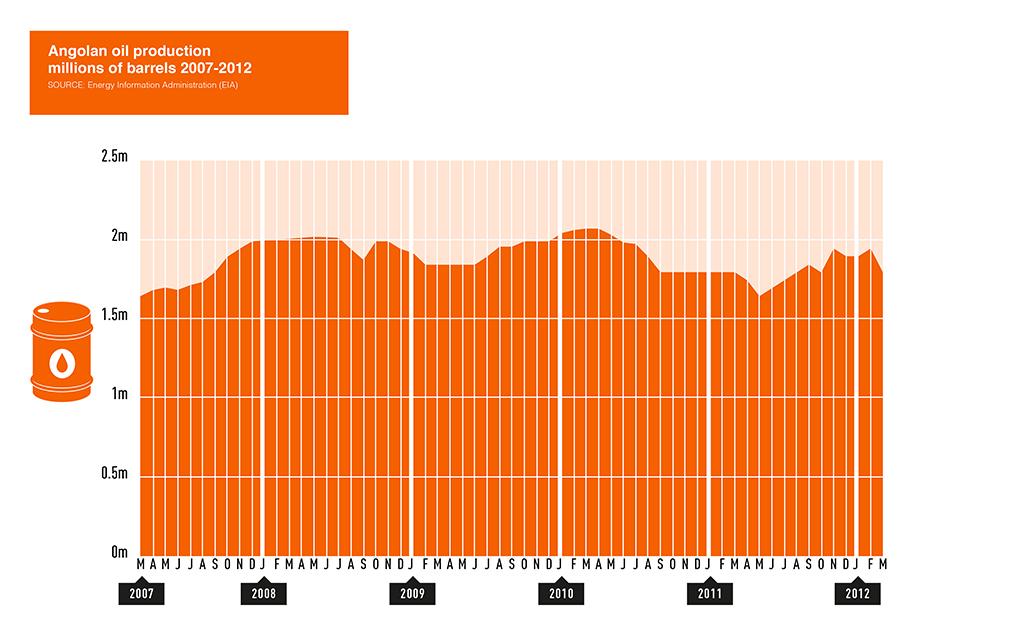
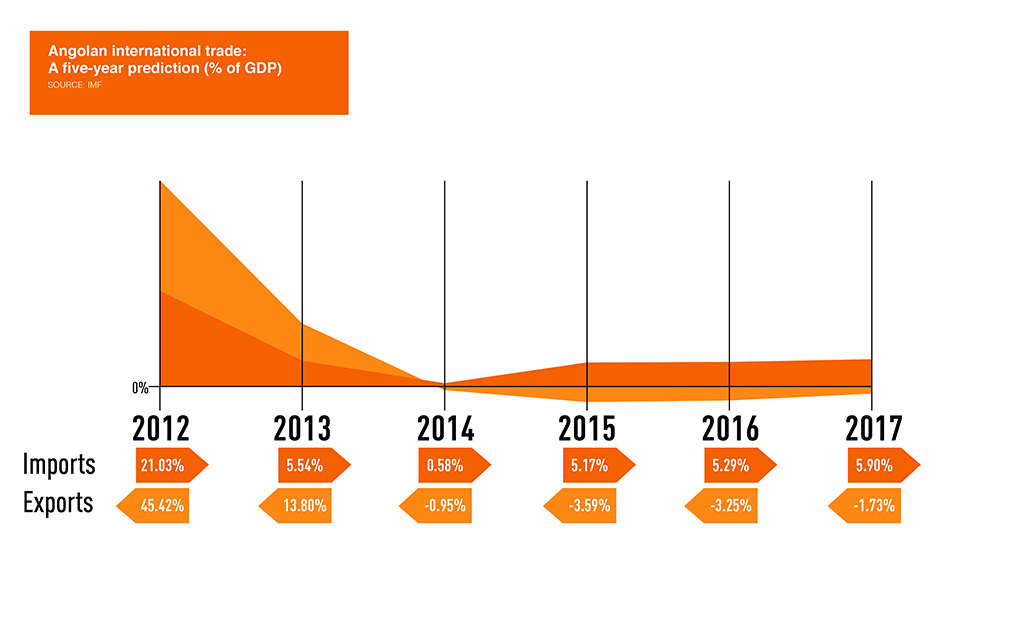
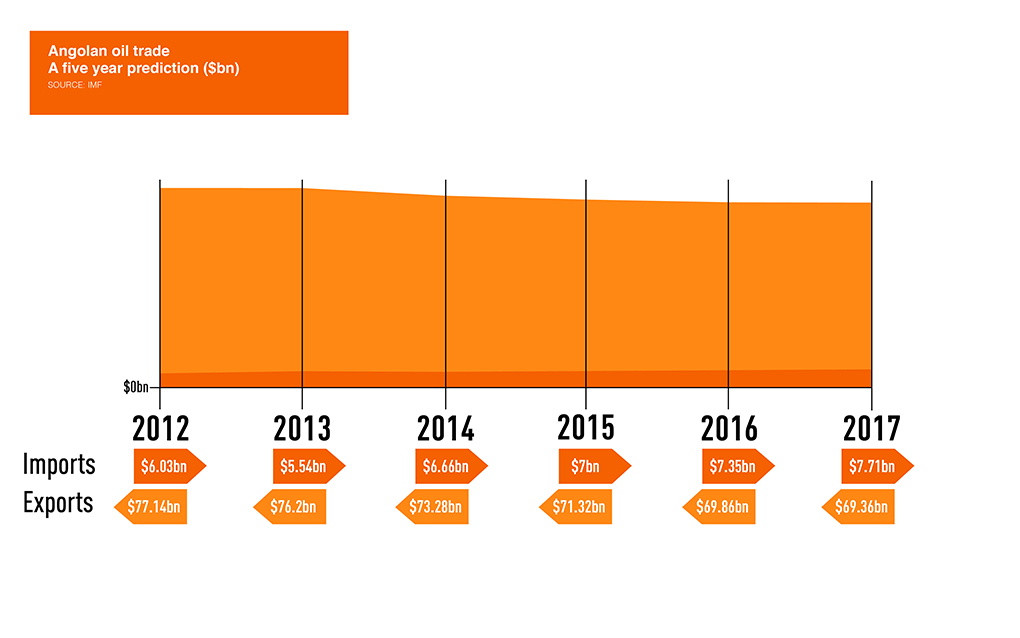
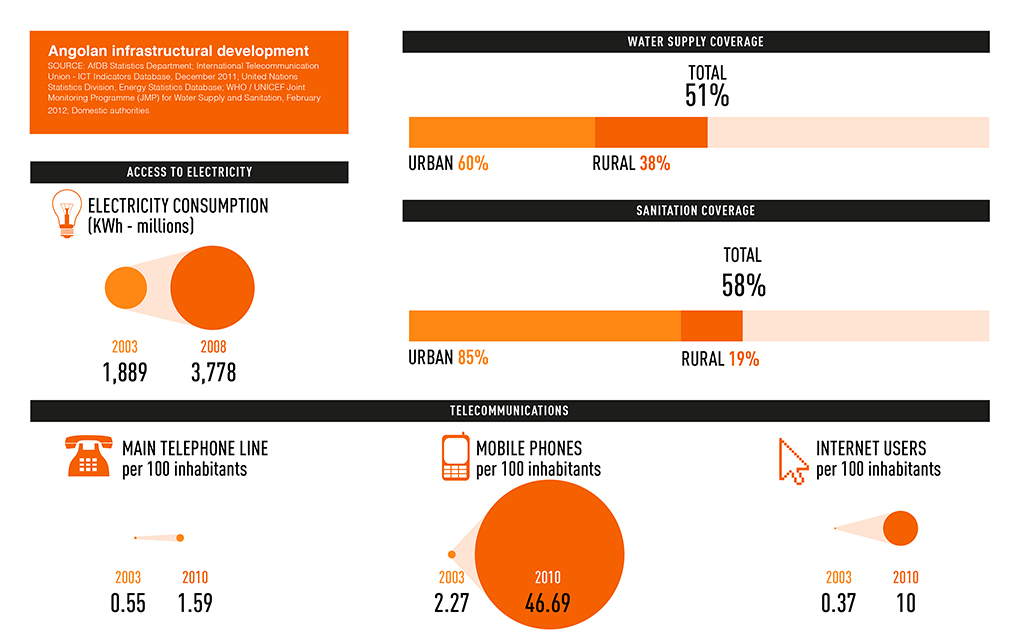
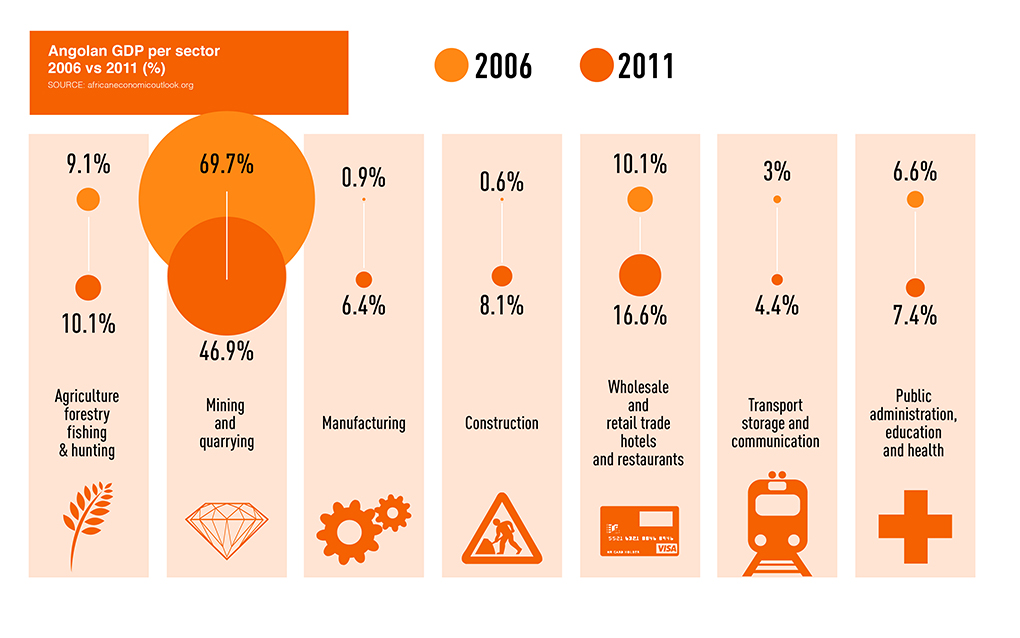
Although fluctuating oil prices have presented challenges to Angola, the country has rapidly evolved along with ever-changing macroeconomic conditions to better improve its economic standing and to create a stable banking system. Development in Angola is expected to prosper as the economy stabilises further.
Please see here for the Portuguese version.
Development in Angola is well under way. The Angolan banking sector is on the up and largely structured around the country’s oil and fossil fuel resources. As such, development in Angola is subject to the same global market fluctuations as the industries it serves. In the three-year period prior to 2010, economic growth and development in Angola had slowed significantly against the backdrop of the strong growth witnessed in the seven-year period since 2000.
This stutter in development in Angola was largely due to a significant drop in oil prices in international markets, resulting from a decline in demand for oil. However, since 2010, growth has resumed on its upward trend, and the banking sector in Angola, influenced by the dynamics of the macroeconomic climate has grown also.
In line with the banking sector, the economy of Angola as a whole has emerged as one of the main powerhouses in the sub-Saharan region. This strength has helped the development and internationalisation of the Angolan banking industry, with neighbouring countries, commercial partners and also nations that share cultural similarities.
In terms of the economy overall, development in Angola has been bolstered by the growth of the country’s GDP, which has developed at a healthy and more importantly, sustainable rate. Accompanying this, the banking sector has also developed in terms of size and profitability. According to research published by KPMG, income from the Angolan banking industry grew at a rate of 24 percent between 2010 and 2011, and the financial margin increased by 53 percent. Both the economy and the banking sector are still maturing on the world stage, which will continue to create further opportunities for banking and financial institutions.
Over the last few years it has been observed that the banking sector in Angola has continued to develop at a surprising speed, with new financial and banking institutions – both domestic and international – playing a bigger role in the market. In addition to this, there has been a steadily growing percentage of the population that uses banks on a regular basis, which in turn, has encouraged development in Angola to be of a greater and more diversified offering in terms of banking products and services.
However, there are a number of infrastructure-related challenges that Angola needs to handle in a growing market place. Firstly, there needs to be well-defined and implemented strategy that can help address issues in individual business strategies, one which will create value in terms of the development in Angola’s growing economy by taking advantage of the huge potential in banking opportunities. There also needs to be a revision of the country’s regulatory code, coupled with a standardisation of international good banking practice.
There is furthermore a demand for sound internal governance structures, together with continued monitoring, control and regulation of the sector, which, taken as a whole, will prove effective in reinforcing the positive and forward-looking dynamics of the banking sector. To this end, banks such as Banco BAI play an important supervisory role within the whole financial system, in assuring the regulatory evolution of the sector.
Finally, the emergence of products and services in the private banking sector, such as electronic banking, Central Bank securities, mortgages, loans and electronic transfers have all been a key focus for practitioners within the Angolan banking community, as have the promotion of Kwanza savings products. This has helped to maintain its competitiveness as a nation and contributed to the country’s economic growth and to overall development in Angola.
It is worthwhile to remain aware of development in Angola as the nation begins to participate more in global trade and business. Angola is Africa’s third largest oil producer behind Nigeria and Libya and in January 2007 became the 12th member of the Organization of Petroleum Exporting Countries (OPEC).
According to the 2011 BP Statistical Energy Survey, Angola’s oil reserves reached 13.5 billion barrels in 2010, equivalent to just under 20 years of current production, and representing 0.97 percent of global oil reserves. Angola produced an average of 1,851,000 barrels of crude oil per day in 2010, 2.31 percent of the global total. Angola exports more than 90 percent of its crude oil, primarily to China and the US. Its oil and oil-derivatives industry accounts for 91.92 percent of total exports. This is a significant factor contributing to development in Angola.
With the help of this main export, Angola has poured billions into reconstruction and in furthering the development in Angola through a variety of projects. It has invested heavily in renovating its infrastructure, particularly in terms of railways, schools, airports, hospitals, roads and housing. Finally, the manufacturing and agriculture sectors are also in their ascendance.
On an international scale, Angola has forged strong strategic partnerships and trading relations with China, Brazil and Portugal but also with Europe and the US thanks to its oil exports. Development in Angola has come a long way since its 27-year war, and the country is now regarded by many savvy investors as a close second behind South Africa in terms of its economic firepower within the Southern African Development Community.
The regulation of the banking sector in Angola continues to improve, and in recent years the bank has worked in conjunction with the authorities in helping to formulate and implement a series of legal regulations, which provide the necessary tools for the healthy functioning of the financial sector and development in Angola.
Although the bank is aware that current local regulations may not today be the strongest to be found in Central and Southern Africa, concerted are efforts being made to improve the situation and ensure that progress is made towards the development in Angola’s banking system. For example, the work that is currently underway towards the adoption of the International Financial Reporting System and the implementation of Basel III, shows a growing level of convergence of the Angolan banking system with international banking standards.
Basel introduced changes within the banking regulation to strengthen global capital and liquidity rules. The Angolan financial services authority does not yet need to implement this but Banco BAI conducts its activities with a conservative risk and liquidity management policy, sometimes making liquidity a priority over profitability.
Basel introduced changes in banking regulation through its measures to strengthen global capital and liquidity rules, assessed by Liquidity Coverage Ratio and Net Stable Funding Ratio. This financial reform increases the minimum solvency ratio, by including a systemic risk component in the Tier 1 Capital.
In December 2011, the bank’s cash ratio and reduced liquidity ratios reached 60.85 percent and 17.91 percent, respectively, and it is the intention of the bank to maintain these levels of solvency. BAI has consistently presented solvency levels that are significantly above the regulatory limit of 10 percent, and this is largely due to its emphasis on systemic risk. To this end, in December 2011, the bank’s Tier 1 capital ratio reached 17.83 percent.
Another important step to achieving these goals has been in July 2010 the establishment of a Compliance Office to supervise internal, national and international compliance rules as well as to increase awareness. With all these measures in place, BAI believes that it has taken all the steps necessary to ensure the smooth implementation of the Basel regulations, should the Angolan financial services authority choose to enforce it.
In the 2012 World Finance Banking Awards, Banco BAI was recognised as the Best Banking Group, Angola.
Founded in 1996, Banco BAI today tops the rankings of Angolan banks in terms of assets, deposits, number of clients and its credit portfolio. With its headquarters in Angola, the bank has a nationwide reach with 106 branches focused on investment banking and vast range of retail services provided by a primarily local workforce of 1,538 well-trained staff. In 2011 it had just over 414,000 customers, representing an increase of 29 percent over the previous year. Banco BAI’s national presence shows strong support for development in Angola.
Due to the importance of the oil and gas sector of the Angolan economy, BAI had always dedicated efforts to service this industry. Now it has taken this a step further by creating an oil and gas desk with a dedicated staff, which primarily focuses on providing banking solutions to this very sophisticated customer. This may include treasury and foreign exchange solutions via various cash management products and operational excellence. Banco BAI’s oil and gas desk has come at a crucial time where a new foreign exchange law for the oil and gas industry has been passed, although gradual, its implementation is expected throughout 2012 and mid-2013.
In 1998 BAI began its global expansion strategy with the opening of two branches in Portugal. It next opened branches in Cape Verde. By opening branches globally BAI is working hard in giving opportunities, investing and empowering the local people and resources. BAI Micro-Finances (BMF) is now a fully operating division of the BAI Group, providing essential loans and financial advice to the rapidly growing number of small-to-medium-sized enterprises (SMEs) in the Angolan community. As such it is a key player in the drive towards the on-going development in Angola.
BMF was created to provide banking services to lower income Angolans struggling to create their own businesses and empower them to increase their standard of living. Since it commenced in August 2004, over 70,000 clients have been able to take advantage of its credit loan offering. As a result of these operations, Banco BAI’s credit value increased to $1.3bn and saw a 42 percent increase in its client base.
As testament to the bank’s dedication to the BMF division, in July 2010 Banco BAI separated its Credit Analysis and Recovery divisions, in order to strengthen its capacity, with the result of it being able to manage the associated risk and closely observe its clients’ activities to reduce non-performing loans.
In terms of the scale of BAI in Angola, the BNA (the Angolan Central Bank) annual report for 2011 highlighted the extensive reach of BAI in the country. According to the report, in 2011, BAI held 27.22 percent of the total market share in terms of deposits in the country, and was responsible for 12.2 percent of all credit offered by all commercial banks. Furthermore, BAI managed to maintain its market-leading position in terms of total deposits and credits, and in these areas it captured a further 20 percent market share, a success story which meant that it closed the 2011 fiscal year with net assets in excess of $11.887bn, representing an increase of approximately 42 percent over 2010.
Finally in 2011, internationally recognised magazine The Banker listed BAI in 22nd position in the ranking of the 25 largest banks in Africa, and in 686th position in the league table of the 1,000 largest banks in the world. It is evident BAI’s market dominance places it in an excellent position to support and invest in development in Angola.
The bank is now seeking to maintain its top-ranking position, and to this end is making significant investments in developing its workforce, creating a state-of-the-art training centre and also offering overseas training opportunities. BAI remains steadfast to the philosophy that investing in people will generate better results. Not merely financial results, but other essential aspects of successful banking operations, including client relations, something it believes can be achieved by improving confidence and decreasing transaction risks.
In terms of the more tangible financial results, the bank is aiming to continue to succeed in this field, by allocating as its number one priority the country’s credit requirements, together with focusing on redressing compliance issues as last, but by no means least, being involved in socially responsible projects and ‘giving back’ to the country as much as the country has given the bank.
Banco BAI won the World Finance award for Best Banking Group in Angola for 2012. This award represents the culmination of 14 years of dedication to the banking sector and strong support of development in Angola. In 1998 Banco BAI began its global expansion strategy with the opening of two branches in Portugal, closely followed by branches in Cape Verde. By opening branches globally BAI is seeking to enhance personal and business banking opportunities, encourage business investment and at the same time, empower the local people and resources in every nation in which it operates.
Furthering development in Angola has always been a top priority for the bank. BAI Micro-Finances (BMF) is part of BAI Group and was created to provide banking services to lower-income Angolans struggling to create their own businesses and empower them to increase their standard of living. Since it opened in August 2004, over 70,000 clients have benefited from credit loans. BMF was not only part of a lucrative return investment strategy, but was also motivated by a deep-rooted sense of social responsibility as a means to respond to the needs of the community.
Other member companies of the BAI Group include BAI Europa (banking), BAI Cape Verde (banking), Nossa Seguros (insurance company), Griner (construction), Imogestin and Novinvest (real estate). It was created to provide banking services to lower income Angolans struggling to create their own businesses and empower them to increase their standard of living.
In terms of social and philanthropic ventures, the bank’s social responsibility initiative is aimed at improving the health and basic level of education of Angolan children. BMF’s initiatives make it crystal clear that Banco BAI is dedicated to making investments in people, with the aim of making a difference in society and overall. The bank sees its staff as an asset, which with the right level of investment and nurturing will bring better results in the long term.
In the field of Corporate Social Responsibility, the bank has dedicated not insignificant funds in contributing to a more equal Angolan society, with the aim – ultimately – of assisting social development in Angola. Several projects in this area have received financial support from BAI, including social involvement initiatives, particularly directed towards sport, culture, education, child health and social integration.
Some of the most notable initiatives are the TISA, a project aimed at equipping classrooms with computers in Lubango, Capital of Huila a South province of Angola – something which BAI feels provides an essential stepping stone in achieving the country’s goal of technical inclusion, which in itself is one of the cornerstones as laid out by the Angolan government as one of its strategic objectives in its fight against poverty.
The bank also pays special attention to the issue of public health in Angola, focusing particularly on the requirement for new hospital equipment to enhance public health services. To this end, since 2010 it has invested in paediatric facilities – most notably refurbishing the paediatric room of Américo Boavida Hospital with technical equipment. In terms of public health, BAI is currently engaged in a partnership with the Neves Bendinha hospital in Luanda, which specialises in burns and last year BAI donated a high-voltage electric power generator to this hospital.
Finally BAI also makes significant investments in promoting national sporting and arts events. It supports basketball, having established the country’s National League of Basketball BAI, and has also founded BAI Art, an annual art event aimed at supporting the local artists. Both of these initiatives demonstrate the ways in which corporate institutions with a social conscience not only can invest in social projects, but also illustrate to other corporate, by demonstrating results, the importance of giving something back to society.
Since its incorporation, Banco BAI has dedicated itself to servicing the requirement of Angola’s flourishing oil industry, while at the same time maintaining a clear focus on fulfilling its self-imposed obligations, both in terms of conforming to international standards of banking and also social responsibility.
To this extent, BAI has provided the people of Angola with a superior banking service offering and has also served the public interest in a number of key areas, the most prominent being in terms of public health, education and sport. It is truly seen as a major contributor to the advancement of the sector and Angola’s development.